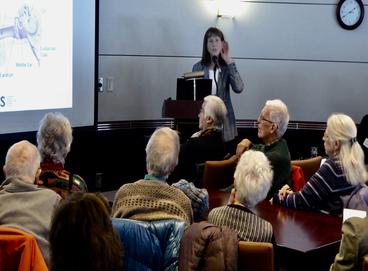Workshop Highlighted the Benefits of Dealing with Hearing Loss
A large and engaged audience attended UMRA’s January 2020 Living Well Workshop on hearing loss presented by Liz Anderson, PhD, an audiologist and researcher at the University’s Center for Applied and Translational Sensory Science. Dr. Anderson began by noting that hearing loss is the most prevalent medical condition among adults, experienced by half of those over 75, and said that dealing with hearing loss “is more important than you might think,” because it has been associated with falls, cognitive decline, and social isolation.
By far, the most common type of hearing loss among older adults is sensorineural hearing loss, in which the hair cells that detect sound in the inner ear become flattened and disorganized, leading to less sensitivity.
Sensorineural hearing loss is not curable, but it can be greatly helped with hearing aids. Older hearing aids were large, had short battery life, and were prone to annoying feedback. Modern hearing aids have dealt with all these problems, with both behind-the-ear and in-the-ear types becoming sleeker and more svelte. Additionally, many have new electronic capabilities, including Bluetooth streaming, phone apps for adjusting the device, rechargeable batteries, and health monitoring.
Feeling competent and confident
Hearing aids work best when the individual wearing them feels competent operating them in a variety of situations. Training and assistance with adjustments have been shown to increase users’ comfort and confidence in using hearing aids. Those who begin using hearing aids while their hearing loss is still moderate adjust more easily than those who wait until they have severe hearing loss.
Anyone with hearing loss can employ behavioral strategies to improve their communication with others. Dr. Anderson’s tips include:
- Move closer to the person with whom you are talking and face them. Even without lip-reading, seeing a person’s face improves understanding.
- Don’t bluff if you don’t hear something.
- Be specific about what you don’t hear. Don’t just say, “What?” Ask, “What date did you say?”
- In noisy environments, try to move away from the noise. There’s even an app for checking and rating noise levels in restaurants, etc. [Visit soundprint.com to learn more.]
In addition, Dr. Anderson suggested the website Hearing Health Matters as another resource for information on hearing loss and hearing technology.
Acknowledging even mild hearing loss and proactively dealing with it, through technology or behavioral strategies or both, is likely to lead to a more satisfying interpersonal life than simply ignoring the loss.
—Ron Matross, chair, Workshop Committee
